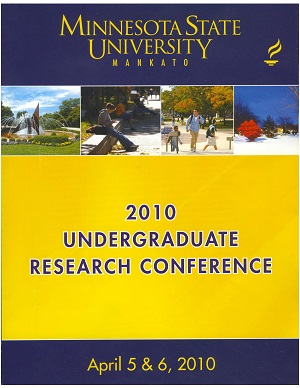Perceptions of N1H1
Location
CSU 201
Start Date
6-4-2010 10:00 AM
End Date
6-4-2010 12:00 PM
Student's Major
Psychology
Student's College
Social and Behavioral Sciences
Mentor's Name
Karla Lassonde
Mentor's Department
Psychology
Mentor's College
Social and Behavioral Sciences
Description
In this study, we assessed students’ perceptions of the H1N1 virus based on research done on unrealistic optimism. Individuals demonstrate unrealistic optimism concerning a health risk when they view themselves as being less susceptible to a health risk than their peers without any logical reason for doing so.
Eighty students in the psychology department participated in a three-part survey measuring their perceptions of H1N1, perceived risk for H1N1, and unrealistic and dispositional optimism. We expect to find that on average, students will perceive themselves as being less at risk for getting H1N1 than their peers. We expect that some moderators for unrealistic optimism will be the extent to which the student was exposed to others that contracted the virus and whether they contracted the virus themselves. We also expect to find that the higher a student’s dispositional optimism, or how optimistic they are in general, the more unrealistically optimistic they will be towards H1N1. A danger of being unrealistically optimistic towards a health risk such as H1N1 is that this unrealistic optimism could make individuals feel overly at ease to the point where they do not partake in preventative behaviors. These individuals may also be less willing to seek proper treatment.
Perceptions of N1H1
CSU 201
In this study, we assessed students’ perceptions of the H1N1 virus based on research done on unrealistic optimism. Individuals demonstrate unrealistic optimism concerning a health risk when they view themselves as being less susceptible to a health risk than their peers without any logical reason for doing so.
Eighty students in the psychology department participated in a three-part survey measuring their perceptions of H1N1, perceived risk for H1N1, and unrealistic and dispositional optimism. We expect to find that on average, students will perceive themselves as being less at risk for getting H1N1 than their peers. We expect that some moderators for unrealistic optimism will be the extent to which the student was exposed to others that contracted the virus and whether they contracted the virus themselves. We also expect to find that the higher a student’s dispositional optimism, or how optimistic they are in general, the more unrealistically optimistic they will be towards H1N1. A danger of being unrealistically optimistic towards a health risk such as H1N1 is that this unrealistic optimism could make individuals feel overly at ease to the point where they do not partake in preventative behaviors. These individuals may also be less willing to seek proper treatment.
Recommended Citation
Martin, Samuel. "Perceptions of N1H1." Undergraduate Research Symposium, Mankato, MN, April 6, 2010.
https://cornerstone.lib.mnsu.edu/urs/2010/oral-session-09/5




